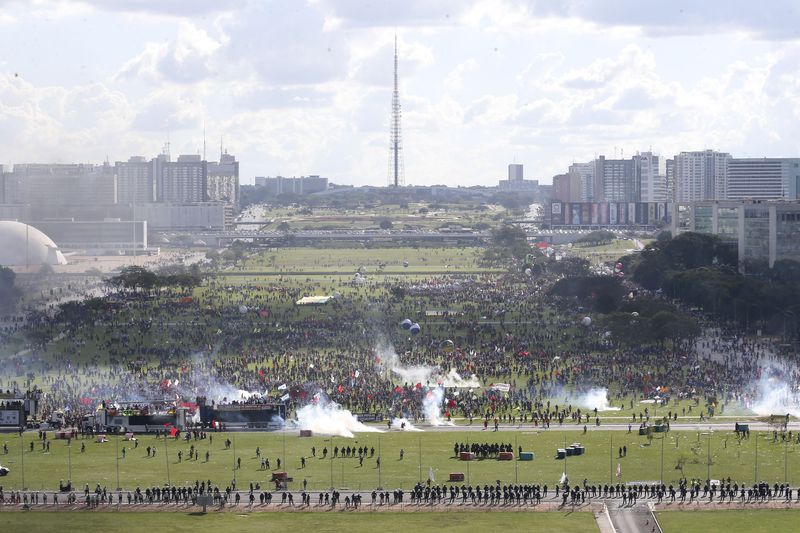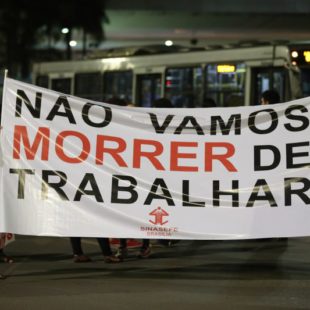01/06/2017 11:46

Oppression at the Occupy Brasília demonstration against neoliberal reforms and for direct elections (Photo: Fabio Rodrigues Pozzebom/ABr)
The activities of the office of Prosecutor General of the Republic (PGR), after the owners of JBS turned state’s evidence and the Globo TV network launched a vicious campaign to destabilize Michel Temer’s administration, clearly reveal the breakdown of the bloc of political forces who carried out the parliamentary, media and legal coup behind the downfall of President Dilma Rouseff, legitimately elected in 2014. A growing wave of popular demonstrations since the country was shaken by this new and dramatic chapter in the political crisis is now pointing to a democratic outcome, through direct elections. Even so, the group that took over the presidency is beginning to look like it may actually be able to hang onto its power.
Since the first impact of scandalously generous rewards to plea bargainers, particularly when the usurper now in power was caught striking late-night deals with confessed criminal Joesley Batista, the parties whose support is vital for the PMDB government, mainly the PSDB and the DEM, have backed away from their initial antagonistic stances and closed ranks around the conclusion of neoliberal reforms that reduce the historic rights of working people.

Banner against the Social Security Reform (Photo: Fabio Rodrigues Pozzebom/ABr)
No matter the spectacle of a walking-dead President, rotting away in plain sight, the “grandeur” of destroying most of the population’s rights must be attained, through Congressional approval of reforms to labor-relations and social-security laws. To that end, the parties that organically stand for capital and its interests have not flinched at sacrificing their own political legitimacy in the eyes of public opinion and their own voters. Their leaders make no bones of their zero commitment to fighting corruption, clear in their ambiguous handling of Temer’s crimes of bribery, compared to their outright condemnation of what they had characterized as Dilma’s “fiscal juggling”.
The business daily Valor Econômico¹ announced an agreement between Temer and former president Fernando Henrique Cardoso, to approve the reforms. In the same paper, in a column not at all aligned with such unconditional support for the government, Marina Silva² denounced Temer’s obstruction of justice and his attempts to block Operation Carwash, but said nothing at all about anti-popular measures pushed by Temer and his congressional supporters. It has become very clear that even the forces that supported the coup without joining the new government are now firmly united in this strategic option against the rights of Brazilian working men and women.
This strategy to tear down the 1988 Constitution and the nearly 30 years of laws that implement its innovations in our fragile democracy obviously denotes a brutal, systematic, nation-wide offensive in all spheres of Brazilian society, aimed above all against the most impoverished populations of the cities, forests and countryside.
A summary of all the setbacks and losses suffered in the first year of the Temer government would not fit in this editorial. Recent episodes, however, such as the massacre of farmworkers in the municipality of Pau d’Arco, show how the political regression that has swept the country has been a green light for repressive forces to unleash full-scale attacks against family farmers, indigenous peoples, slum dwellers, women, young people, especially blacks, and all other vulnerable sectors of the Brazilian people, to say nothing of the police repressing street demonstrations by the left and social movements.

Vigil in Pará to honor the victims of the Pau d’Arco massacre. (Photo: SINTEPP)
In Pará, the report by members of the State Legislative Assembly’s Human Rights Commission totally disavowed the police’s account of the facts and revealed that the ten victims were actually slaughtered. Based on the testimony of survivors and relatives of the victims in Pau d’Arco, in addition to the official version, the Assembly’s report to authorities responsible for the investigation concluded that law enforcement agents violated human rights, disobeyed legal protocols and staged the crime scene, by removing the bodies from the scene to a hospital. There are signs of executions.
We will never understand the nature of class struggle in Brazil, radicalized by the ruling class into this constant and growing violence, until we face up to our country’s recent history. We must understand how class conciliation policies – based on a combination of moderate gains for the poorest alongside fully successful accumulation for finance, construction and agribusiness – have helped to naturalize the violations of people’s rights in the most diverse urban, rural and forest territories marked by so-called development projects.
[1] Article in Valor Econômico: “Temer faz pacto com FHC para votar reformas,” published on May 31, 2017.
[2] Column entitled “Arquiteto da Destruição”, published in the same issue of that newspaper.










